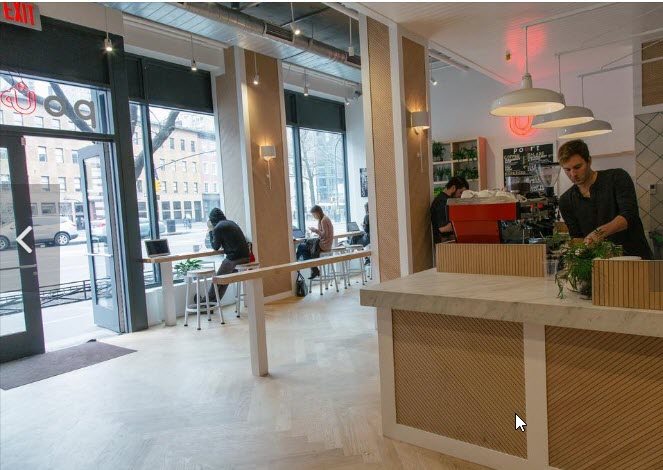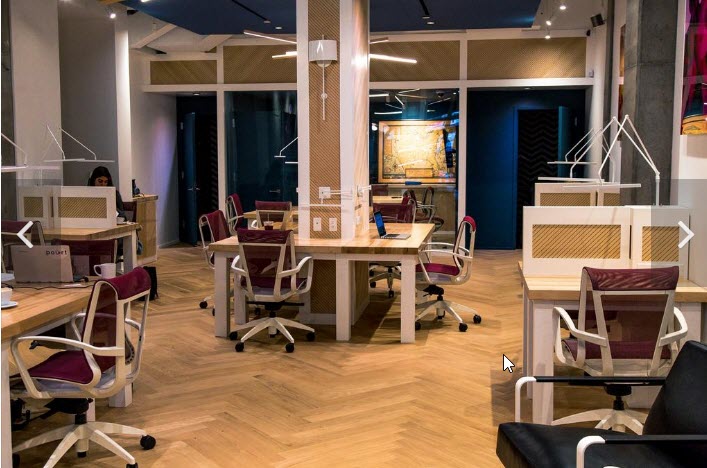Ever wonder how coffeehouses in New York survive paying top rents when so many customers sit for hours stirring their $3 coffee?
Pourt is a new entry that has an answer: it combines an appealing coffee bar with a separate co-working space that charges by the hour or day.
Pourt, which opened late January 2017, charges $7 an hour plus $3 an hour for bottomless coffee, and offers discounted plans for longer stays such as $60 for 10 hours and $199 for 40 hours (30 percent off).
It offers services that coffeeshops don’t, such as a six-person conference room, speedy fiber-optics Internet, Mac and iPhone chargers and Skype facilities. In fact, the workspace has 18 individual desks plus the conference room.
A hybrid space
Pourt is striving to create a new hybrid, a mixture of coffeehouse and workspace, emphasizing short-term stays. Whether there are enough freelancers and small businesses that can pay those fees is yet to be determined.
It‘s located on Cooper Square, strategically situated near Cooper Union, NYU, Manhattan Marymount College dorms and the Standard Hotel in the bustling East Village. The combined space measures 2,000 square feet.
Founders Matt Tervooren, 28, and 27-year-old Mike Kruszewski, lived in the East Village (Tervooren recently moved to Williamsburg) and met as economics majors at the University of Michigan. When they freelanced, they were “consistently frustrated by the lack of good Wifi, lack of available seating, or having the barista frowning at you if you don’t order more food,” Tervooren noted.
Pourt, he said, “combines the two concepts, a coffee shop with a comfortable work space.” And what differentiates Pourt from other co-working spaces such as WeWork and Regus is customers “don’t have to make long-term commitments. If you’re looking for a permanent office, we’re not right,” he admitted.
Their concept targets freelancers, small-business owners and students working on projects individually or in teams (who can pay $99 for 30 hours, a 30 percent deal) who want “more flexibility and don’t want to get locked into a monthly thing,” Tervooren said. He’s seen an array of start-up execs coming in that specialize in virtual reality, private equity and social media.
Co-working guests can order food and beverages on their smartphones and have it picked up steps away from their workstation.
Two revenue streams
Though Pourt is carving out a niche for temporary stays, the daily or weekly visits make it more difficult to generate steady income. It expects to compensate by appealing to a wider swath of customers. “We think we’ll get more people who might otherwise stop by Starbucks,” Tervooren said.
At Pourt, customers are “surrounded by people who are doing similar things. You don’t have to deal with the couple having a confrontation or a baby crying,” he said.
They’ve identified a host of mostly neighborhood favorites as suppliers for their coffee bar including Tompkins Square Bagels, Amy’s Bread, Intelligentsia coffee (which is based in Chicago) and Liquiteria juices. It’s also applied for a beer and wine license and plans to serve local craft beer and wines in the café area.
Its lunches include kale salad with chicken breast, roast turkey sandwich, white bean and avocado soup, so the co-working clientele never has to leave to go elsewhere.
There’s a glass partition that separates the workspace from the coffee shop and customers that only want to order lunch plus a beverage don’t have to pay a daily fee and can dine on one of the stools in the front room.
The two founders see the concept as generating two steady revenue streams. Some guests will treat it as another local coffeehouse, and others gravitate toward the workspace and grab a sandwich as well.
Ramping up marketing
The founders drafted an elaborate business plan and raised sufficient capital from family, friends and business associates, though Tervooren declined to specify exactly how much.
Previously Tervooren founded Repunch, a tech start-up that focused on generating local merchant loyalty. It thrived for several years and raised venture capital funding before fading.
To keep their costs down, the founders assisted by Andrew Tervooren, Matt’s brother, have been serving as the staff. Once it settles in, they expect to hire additional staff to lighten their load.
Yelp responders have been positive. One responder said, “Who knew a bunch of dudes could tastefully design a coffee joint/work space?” He liked the drip coffee and noted the top-of-the-line $20,000 espresso machine. He also liked the “decent workspace in the back and will definitely be back.”
So far, Pourt has relied on word-of-mouth and location to generate business, but Tervooren expects to ramp up marketing efforts as they settle in. He expects to tap connections from his previous business with media companies that specialize in food and eateries and strengthen its social media presence. He envisions running cross promotions with Cooper Union and NYU.
They named it Pourt as a pun suggesting pouring as in coffee or tea, a port as a safe haven and port as in something you plug into.
Tervooren said its success depends on whether people “are willing to try a new concept and understand the value proposition.” It expects to engage fully in the vibrant East Village neighborhood, connect with local small businesses and the thriving university scene evidenced by its discounted student packages.
He also thinks the concept is “scalable. With the amount we’ve learned in getting this up and running, we’d be able to roll out subsequent spots on a much more expedited timeline.”
“We want Pourt to be an oasis,” Tervooren said.

